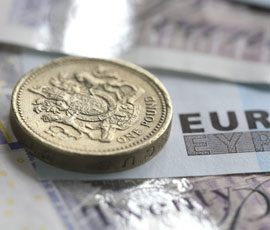Weakening sterling boost UK farm incomes

Sterling has weakened by nearly 7% against the euro over the past four months, potentially boosting UK farmers’ single farm payments by £240m.
“For every 1p/euro change in exchange rates, the UK’s single farm payments alter by around £40m,” said Pat Tomlinson, director at accountant Old Mill. “But currency changes have a far greater impact than that, affecting the competitiveness of exports and cost of imports enormously.”
SFP only accounted for around 15% of UK farm incomes, with other income heavily reliant on either export markets or import threats – and hence exchange rates, he added. “A 1p weakening against the euro will add £200m to UK farmers’ total income from the market – and sterling has weakened by 6p since the end of September.”
For example, a farmer producing an 8.6t/ha wheat crop should get about £18/ha more from wheat sales with the euro worth 1p more – nearly 10 times greater than the impact on that farm’s SFP.
“In a perfect and transparent marketplace, prices for UK farm products that compete against European goods like cheese, meat and grain, should have increased by 7% since September,” said Mr Tomlinson. “Of course, other supply and demand factors come into play, but farmers should not lose sight of this 7% increase in price negotiations with buyers.”
There is a downside, however. Inputs like feed, fertiliser and sprays, which UK farmers import from Europe, or compete for with European farmers, could now be 7% more expensive in sterling terms. “The machinery market is also affected, with purchases frequently exceeding the value of a farm’s SFP. However, export values for traded-in machines will have improved, to help offset price increases on new machines.”
Farmers could hedge against currency movements in a number of ways, said Mr Tomlinson. “Exchange rates will fluctuate and it’s important to understand the full impact of this on the business beyond just the SFP – and then decide how much, if any, of that impact should be protected against.”
Before agreeing any deal, farmers should shop around to get the best rates from brokers and banks, said Keith Leddington-Hill, managing director at consultant Laurence Gould. “Today, sterling just seems to be going down, so I would not rush in too quickly. But it is a volatile market and you have to take a view on your attitude to risk and whether the rate on any given day is good enough to lock into.”
